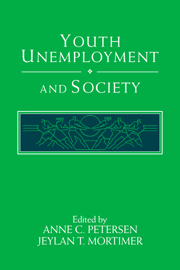Book contents
- Frontmatter
- Contents
- Contributors
- Foreword
- Introduction
- I INVESTMENT IN YOUTH
- 1 Youth, unemployment and marginality: The problem and the solution
- 2 Social capital, human capital, and investment in youth
- 3 When may social capital influence children's school performance?
- Reply to John Modell
- Reply to James S. Coleman
- II MACROSOCIAL PERSPECTIVES
- III INDIVIDUAL PERSPECTIVES
- IV SOCIAL CONSEQUENCES AND INTERVENTIONS
- V IMPLICATIONS FOR RESEARCH
- Index
Reply to James S. Coleman
Published online by Cambridge University Press: 05 May 2010
- Frontmatter
- Contents
- Contributors
- Foreword
- Introduction
- I INVESTMENT IN YOUTH
- 1 Youth, unemployment and marginality: The problem and the solution
- 2 Social capital, human capital, and investment in youth
- 3 When may social capital influence children's school performance?
- Reply to John Modell
- Reply to James S. Coleman
- II MACROSOCIAL PERSPECTIVES
- III INDIVIDUAL PERSPECTIVES
- IV SOCIAL CONSEQUENCES AND INTERVENTIONS
- V IMPLICATIONS FOR RESEARCH
- Index
Summary
The strategy of my chapter in this volume is announced by its title, which asks, “When May Social Capital Influence Children's School Performance?” The implication of my question is that the chapter by James S. Coleman (to which mine is a response) employs the intriguing notion of “social capital” in such a sketchily developed historical context that it neither “works” nor “doesn't work.” In my account, family social capital does not operate directly upon children's school-based cognitive achievements, but rather through children's motivations to learn school subjects that are themselves culturally organized and subject to socially sanctioned competing concerns. I argue that Coleman overlooks historical changes that as well explain U.S. children's mediocre (and arguably declining) success in school as does the decline in family social capital that he has imputed.
Coleman's rejoinder suggests another problem that deserves some thought if social capital theory is to be developed—this time essentially a measurement problem. In his chapter, Coleman describes social capital as consisting of “social relationships within the family and community that generate the attention and time spent by parents and community members in the development of children and youth.” In his rejoinder, however, Coleman maintains that social capital “is not measured by the amount of talk about school between parents and children … [or] the frequency of helping their child with homework,” indicators to which I have referred.
- Type
- Chapter
- Information
- Youth Unemployment and Society , pp. 72 - 74Publisher: Cambridge University PressPrint publication year: 1994



